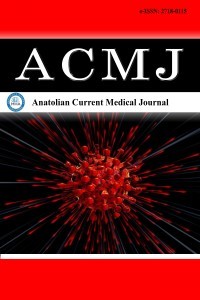1.
COVID-19 Hastalığı ile mücadelede “sağlik çalişanlarinin sağliği”. https://korona.hasuder.org.tr/covid-19-hastaligi-ile-mucadelede-saglik-calisanlarinin-sagligi/ access date 22.04.2022.
2.
Brooks SK, Webster RK, Smith LE, et al. The psychological impact of quarantine and how to reduce it: rapid review of the evidence. Lancet. 2020;395(10227):912-920. doi:10.1016/S0140-6736(20)30460-8
3.
Salari N, Hosseinian-Far A, Jalali R, et al. Prevalence of stress, anxiety, depression among the general population during the COVID-19 pandemic: a systematic review and meta-analysis. Global Health. 2020; 16(1):57. doi:10.1186/s12992-020-00589-w
4.
Killgore WDS, Cloonan SA, Taylor EC, Fernandez F, Grandner MA, Dailey NS. Suicidal ideation during the COVID-19 pandemic: the role of insomnia. Psychiatry Res. 2020;290:113134. doi:10.1016/j.psychres. 2020.113134
5.
Yüncü V, Yılan Y. COVID-19 pandemisinin sağlık çalışanlarına etkilerinin incelenmesi: bir durum analizi. Igdir University Journal of Social Sciences. 2020;373-402.
6.
Global: Amnesty analysis reveals over 7.000 health workers have died from COVID-19. https://www.amnesty.org/en/latest/press-release/2020/09/amnesty-analysis-7000-health-workers-have-died-from-covid19/ access date 21.02.2022
7.
Wang C, Pan R, Wan X, et al. Immediate psychological responses and associated factors during the initial stage of the 2019 Coronavirus disease (COVID-19) epidemic among the general population in China. Int J Environ Res Public Health. 2020;17(5):1729. doi:10.3390/ijerph 17051729
8.
Gökçe T, Dündar C. Samsun Ruh ve Sinir Hastalıkları Hastanesi’nde çalışan hekim ve hemşirelerde şiddete maruziyet sıklığı ve kaygı düzeylerine etkisi. J Turgut Ozal Med Cent. 2008;15(1):25-28.
9.
Bai Y, Lin CC, Lin CY, Chen JY, Chue CM, Chou P. Survey of stress reactions among health care workers involved with the SARS outbreak. Psychiatr Serv. 2004;55(9):1055-1057. doi:10.1176/appi.ps.55.9.1055
10.
Derogatis LR. BSI, 18, Brief symptom inventory 18: administration, scoring and procedures manual. Minneapolis, MN: NCS Pearson; 2001.
11.
Şahin NH, Durak Batıgün A, Uğurtaş S. Kısa semptom envanteri (KSE): ergenler için kullanımının geçerlik, güvenilirlik ve faktör yapısı. Turk Psikiyatri Derg. 2002;13(2):125-135.
12.
Çapri B. Tükenmişlik ölçeği-kısa formu ile eş tükenmişlik ölçeği-kısa formunun Türkçe uyarlaması ve psikoanalitik-varoluşçu bakış açısından mesleki ve eş tükenmişlik ilişkisi. Educational Sciences Theory Practice. 2013;13(3):1393-418.
13.
Santarone K, McKenney M, Elkbuli A. Preserving mental health and resilience in frontline healthcare workers during COVID-19. Am J Emerg Med. 2020;38(7):1530-1531. doi:10.1016/j.ajem.2020.04.030
14.
Mete B, Kartal F, Dönmez E, Acar O. The evaluation of general psychiatric symptoms of medical staffs in the COVID-19 pandemic in Turkey. Medicine. 2021;10(2):409-415. doi:10.5455/medscience.2020.12.252
15.
Kang L, Ma S, Chen M, et al. Impact on mental health and perceptions of psychological care among medical and nursing staff in Wuhan during the 2019 novel coronavirus disease outbreak: a cross-sectional study. Brain Behav Immun. 2020;87:11-17. doi:10.1016/j.bbi.2020.03.028
16.
Lai J, Ma S, Wang Y, et al. Factors associated with mental health outcomes among health care workers exposed to coronavirus disease 2019. JAMA Netw Open. 2020;3(3):e203976. doi:10.1001/jamanetworkopen.2020.3976
17.
Li Z, Ge J, Yang M, et al. Vicarious traumatization in the general public, members, and non-members of medical teams aiding in COVID-19 control. Brain Behav Immun. 2020;88:916-919. doi:10.1016/j.bbi.2020. 03.007
18.
Zhang WR, Wang K, Yin L, et al. Mental health and psychosocial problems of medical health workers during the COVID-19 epidemic in China. Psychother Psychosom. 2020;89(4):242-250. doi:10.1159/000507639
19.
Tan BYQ, Chew NWS, Lee GKH, et al. Psychological impact of the COVID-19 pandemic on health care workers in Singapore. Ann Intern Med. 2020;173(4):317-320. doi:10.7326/M20-1083
20.
Spoorthy MS, Pratapa SK, Mahant S. Mental health problems faced by healthcare workers due to the COVID-19 pandemic-a review. Asian J Psychiatr. 2020;51:102119. doi:10.1016/j.ajp.2020.102119
21.
Nickell LA, Crighton EJ, Tracy CS, et al. Psychosocial effects of SARS on hospital staff: survey of a large tertiary care institution. CMAJ. 2004; 170(5):793-798. doi:10.1503/cmaj.1031077
22.
Huang JZ, Han MF, Luo TD, Ren AK, Zhou XP. Mental health survey of medical staff in a tertiary infectious disease hospital for COVID-19. Zhonghua Lao Dong Wei Sheng Zhi Ye Bing Za Zhi. 2020;38(3):192-195. doi:10.3760/cma.j.cn121094-20200219-00063.
23.
Elbay RY, Kurtulmuş A, Arpacıoğlu S, Karadere E. Depression, anxiety, stress levels of physicians and associated factors in COVID-19 pandemics. Psychiatry Res. 2020;290:113130. doi:10.1016/j.psychres.2020.113130
24.
Bose A. Mental health impacts of COVID-19 in health care workers and coping strategies. IJNRP. 2020;7(1):1-3. doi:10.15509/IJNRP.2020.7.1.373

